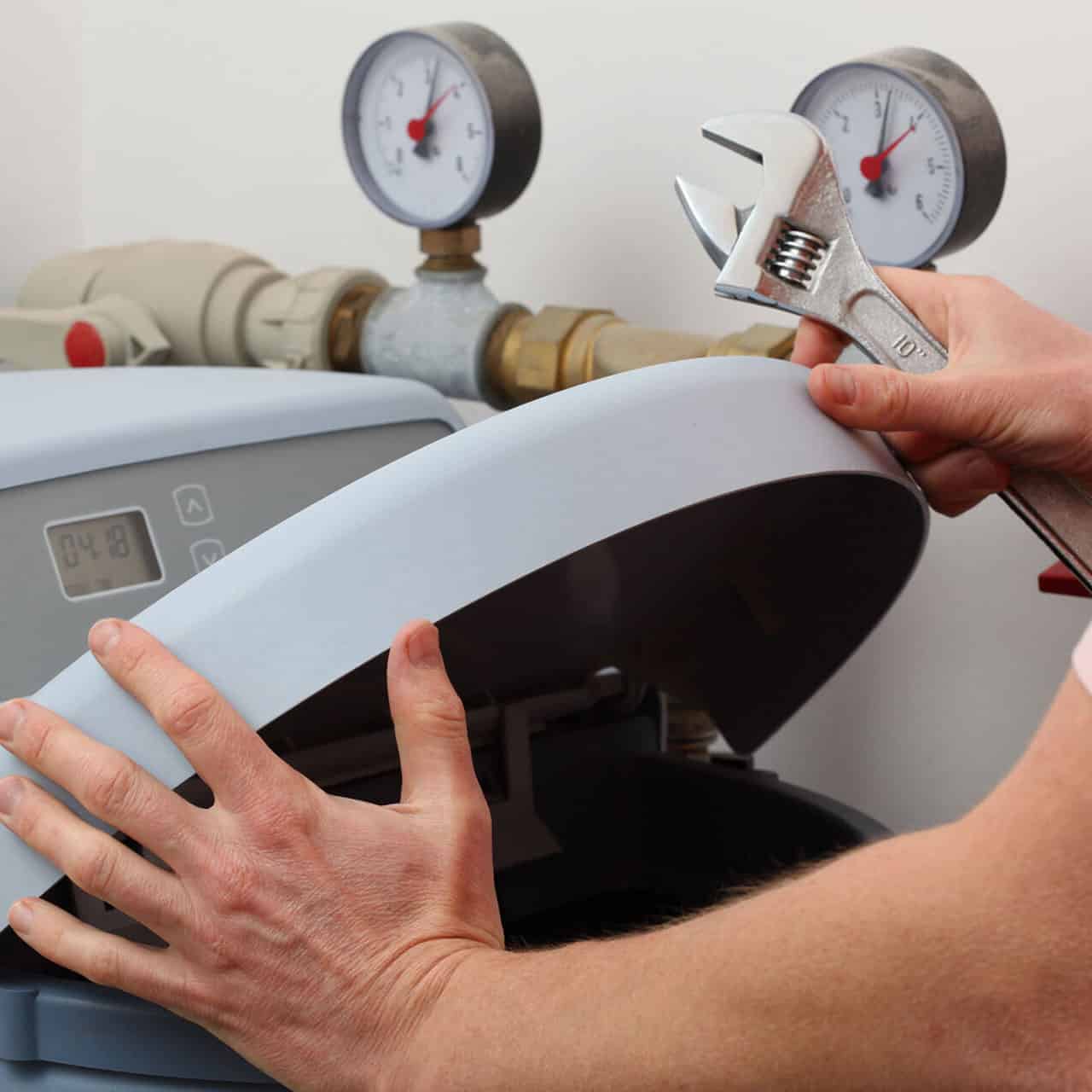What to Know if You’re Looking For a New Water Softener
-
There are so many water softener & conditioner products how do you know which one is best for you?

Especially since you have a lot of options available to you when concerning a new water softening system for your home or business. There are few things you should be aware of as you look for new water softener or a replacement water softener.
The Primary Purpose of a Water Softener
The Primary purpose of a water softener is to counteract the negative effects of hard water. Although hard water can be beneficial to humans, plants and animals it creates problems with build up of calcium and magnesium in plumbing pipes and appliances as well as hot water heaters which cost Americans hundreds of millions of dollars each year. The negative effect of calcium sticking to your hair, skin & clothing has also created a huge industry for hair, skin and soap products designed to counteract these effects.
Benefits You’ll Receive From a Good Water Softener
- Restores rich cleaning ability of soaps & detergents. Cuts usage & costs by 50-75%. You can use less soap & get better results. This will save you money. Also, you can return to natural chemical free healthy soaps and laundering agents. The harsh chemicals in most soaps and detergents are there to combat hard water and still have some lather & cleaning ability. With soft water you will not need these harsh chemical based cleaners.
- Hair and skin feels softer , cleaner, smoother & becomes healthier. Soap rinses from your skin & hair thoroughly leaving behind no harsh residues to harm you.
- Fabrics last longer, are softer & whites stay whiter. Detergents easily rinse out of soft water. Tests have been done taking laundry washed in hard water, then taken and rinsed in soap-less soft water. The soap-less water soon becomes foamy from residues left in the fabrics washed in hard water. Soft water allows detergents to completely rinse out . Fabrics are also softer without hard water minerals trapped in them. Fabrics last longer and whites stay white without the dingy gray caused by hard water.
- No hard water deposits, chalk, orange rings, water spots or soap scum on bathtubs, showers, sinks & toilets.
- Clean shiny silverware and glassware without water spots.
- You save time in house cleaning & embarrassment trying to remove all the hard water deposits.
- Appliances last longer & work better. Soft water increases the life of all water using appliances such as hot water heaters, dishwashers, clothes washers and coffee & ice makers. Hard water wears appliances out quickly and requires more energy use as appliances do not work as well when they are corroded or clogged with mineral deposits. Your hot water heater will heat quicker & more efficiently as an example.You will save money on monthly energy costs & damage to appliances. Some average replacement costs of appliances due to hard water corrosion: $360 water heater, $90 faucet set, $300-$600 clothes washer
- Your plumbing pipes & fixtures will last much longer. Average replacement cost of your entire plumbing system $2000-$4000.
The benefits of a good water softener are more than most people realize initially, and usually involve a cost savings that pays for the softener in about 3-4 years (if you choose the right softener). You can expect a good water softener to last at least 10 years with many lasting much longer. The instant health & quality of life gained are benefits you can t put a price on
The Top 3 Methods Of Softening Water & How They Work
1.) Electromagnetic or Magnetic Water Softeners & Conditioners AKA: wires wrapped around your pipes to create molecular agitation in the water or magnets placed around your pipes. (Also known as easy type water softeners or space age type ) Overall Rating: Poor (These units have a poor performance record so we do not recommend them to our clients.)
- Overview: The majority of these devices claim to work by causing the carbonate salts that would ordinarily form scale deposits to blend as small particles within the water instead. Presumably, This would also reduce the concentration of the calcium and magnesium ions that react with soaps to form soap scum.
- Electromagnetic & Magnetic Water Softener Advantages: Magnetic water softeners claim to reduce the scale buildup and the effects of hard water. Most of the magnetic softener devices are very inexpensive compared to other methods of softening water. They are also very easy to install yourself and once installed, easy to maintain.
- Electromagnetic & Magnetic Water Softener Disadvantages: The degree of efficiency is constantly changing. The magnetic field exists only in the immediate area of the device and therefore only affects behavior of water that has passed through the immediate vicinity of the device. The state of the water after it has been introduced to the magnetic field will only stay in that state for a period of 48 hours (at best), which means if the water is not used for more than 48 hour it will revert back to hard water with the negative effects. Studies also show the treated water passing through a hot water heater returns to it’s hard state. The tests conducted at Purdue University found no significant, beneficial variation in the physical or chemical water quality parameters measured. Even though some people seem happy with these products, when compared to the results & benefits of other systems they don’t measure up. We have just not seen the benefits of a good water softener with these units. Watch out for false benefits & claims with electromagnetic and magnetic water softeners.
2.) Salt Free Water Softeners Catalytic Media Overall Rating: Good in Some Cases
- Overview: Salt free water softeners contain a catalytic-ally working filter media using nano-technology developed to first remove already existing scale from pipes and heat exchanger surfaces (de-scaling effect) and further to protect the system from future formation of scale (scale protection effect). Salt free catalytic media is used in a process where atoms are placed in a special structure so that an active surface is created. This transforms the dissolved calcium carbonate (temporary hardness) so it cannot attach to any surfaces. The hardness is still in the water, but scaling is greatly reduced. The chemical bonds are then rinsed away by the water flow. The size of the bonds is so small (in the range of a nanometer) that they can only be seen with a microscope. Therefore the de-scale effect is the same as if the water was free of temporary hardness (calcium carbonate). The crystals are heat resistant and do not fall apart under high water temperatures or passing through your water heater. This process is actually not true water softening, but water conditioning.
- Salt Free Water Softener Advantages: A good salt free water softener requires no monthly maintenance or additional monthly costs. It conditions the water to reduce scale build up without the use of salt or potassium, therefore there is no need for an expensive reverse osmosis system for drinking water (unless the water contains contaminants you do not want to drink). Salt free water conditioners leave in all the essential minerals for the drinking water requiring no chemicals, electricity, or back flushing to operate. There is no wasted water or drains to install. It allows for up to 50% less soaps or detergents to be used, saving money and in some cases removes and prevents 90% of the scale from forming in all pipes and heat exchangers (hot water heaters). A salt free water conditioner does not fall under any softener ban because it does not discharge salt or potassium back into the groundwater. It is 100% environmentally friendly.
- Salt Free Water Softener Disadvantages: In some cases a good salt free water softener is the most cost effective & trouble free way to remove water scale & get some benefits of truly softened water. Salt free systems do not give the full benefits of a salt based water softener. The water will not feel slick , detergent usage is lessened but not maximized, scaling will be lower but not eliminated. Also, some water supplies contain items that can cause salt free systems to malfunction and not give the desired results. The best way to find out if one of these systems will work for you is to have a water analysis & assessment done.
3.) Salt Based Water Softeners (Ion Exchange) Overall Rating: Best in Most Cases
- Overview: Calcium (Ca2+) and magnesium (Mg2+) ions that cause water hardness can be removed by using a simple ion exchange procedure. Water softeners are Cation exchange devices. Cations refer to positively charged ions. Cation exchange involves the replacement of the hardness ion with a non-hardness ion. Salt-based water softeners use sodium salt (Na+) as the exchange ion. Sodium ions are supplied from dissolved sodium chloride salt, also called brine. In the ion exchange process, sodium ions are used to coat an exchange medium in the softener. The exchange medium can be natural zeolites or synthetic resin beads that resemble wet sand. As hard water passes through a water softener, the calcium and magnesium trade places with sodium ions. Sodium ions are held loosely and are easily replaced by calcium and magnesium ions. During this process free sodium ions are released to the water. After softening a large quantity of hard water the exchange medium becomes coated with calcium and magnesium ions. When this occurs, the exchange medium must be recharged or regenerated. To recharge the softener with sodium ions, a salt based water softener is back flushed with a salt brine solution. During a back flush the brine solution replaces the calcium and magnesium ions on the exchange medium with sodium ions from the salt solution. The time between recharging cycles depends on the hardness of the water, the amount of water used, the size of the salt water softener unit, and the capacity of the exchange media to remove hardness.
- Salt Based Water Softener Advantages: This is the only way to truly soften water. You will experience: Elimination of water spotting and scaling; cleaner, softer feeling clothes. Smoother, softer feeling skin, Longer life of appliances including washing machines, dishwashers and water heaters. Less use of household cleaning products, detergents and personal care products like shampoo.
- Salt Based Water Softener Disadvantages: Softened water from a salt-based water softener is not recommended for drinking, watering houseplants, lawns and gardens due to its sodium content. There are many health risks associated with sodium intake. During the softening process sodium is released from the exchange media into the output water. For every grain of hardness removed from water, 8mg/1 (ppm) of sodium is added. People on restricted sodium intake diets should account for increased levels of sodium in softened water. Your family physician should be consulted. Sodium intake from softened water can be avoided by leaving one kitchen tap un-softened from drinking and cooking. Water used in recharging a water softener may overload or reduce the effectiveness of small septic or sewer systems. Softened water using ion exchange is not recommended for small appliances such as steam irons or evaporative coolers. Salt-based softeners require that salt be added to the system on a regular basis based upon the hardness of the water.
Z PLUMBERZ Are Professionals
We are fully licensed and insured for all of your plumbing, water, sewer and drain needs. Our technicians are clean-cut, polite, friendly, arrive on-time and are background and drug tested for your peace of mind. We operate 24 hours a day, 7 days a week and we never charge extra for nights, weekends or holidays…EVER! For all of our work you are assured of option pricing; you will know the repair options we suggest and the price of each option BEFORE we do any work. You pick and approve the option you like best, only then do we do the work.
-
Request A Quote Or Service Today


